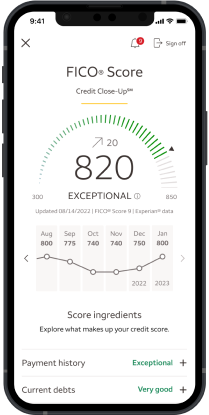![]()
FICO® Score 9 from Experian®
Simple access via Wells Fargo Online, to help you know where you stand.
![]()
Credit Monitoring Alerts
Personalized credit monitoring alerts if Experian® detects an event that may impact your credit score.
![]()
Credit Report
Full access to your Experian® credit report giving you an in-depth look at your credit.
![]()
Personalized Score and Tips
To help you maintain or improve your score.
Credit Close-UpSM is complimentary to Wells Fargo Online® customers, and using it won't affect your score.
 Enroll to get the full picture of your FICO® Score
Enroll to get the full picture of your FICO® Score
Follow these steps to enroll or re-enroll in the new enhanced Credit Close-Up:
- Click "View my Score" below
- Enter your online banking username and password to get started
Screen image is simulated

 Sign On
Sign On 

